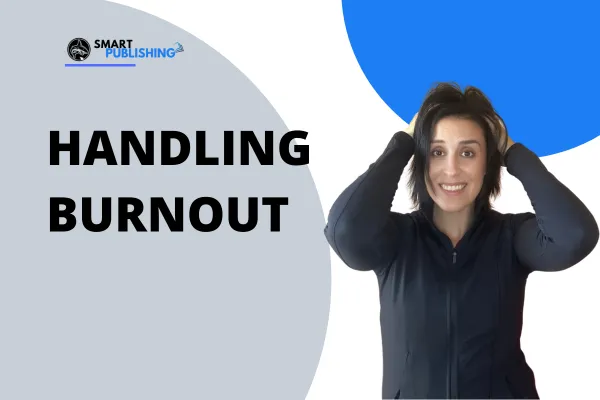
Handling Burnout
How to Handle Burnout Without Abandoning Your Book
By Renée Lautermilch, Chief Editor at Smart Publishing
Burnout—it’s one of those things we all experience at some point, and for authors, it often shows up right in the middle of the writing process. One minute you're full of energy and ideas, and the next you're staring blankly at your screen thinking, I just can’t do this right now.
Sound familiar? You’re not alone. In fact, burnout is one of the most common hurdles I see authors hit, especially those who start out excited and go all-in—only to run out of steam fast.
Let’s break this down. Here’s what burnout really is, what causes it, and how you can handle it in a way that helps you reconnect with your writing without walking away from your book entirely.
What Is Burnout?
Burnout is a feeling of total depletion. Sometimes it shows up in one specific area (like writing), and sometimes it bleeds into everything—your work, your relationships, even your hobbies.
It ranges from “I’m tired of working on this chapter” to “I want to be a potato on the couch and not do anything ever again.”
Understanding where you fall on that spectrum matters—because how you handle burnout depends on how deep you are in it.
Why It Happens
Most burnout is the result of imbalance. Too much hustle, not enough margin. Too much doing, not enough being.
I’ve seen it in authors who block out every spare moment to write. They go hard early on, skip breaks, and burn the candle at both ends. Eventually, they crash.
Here’s a personal example: I once burned myself out on sushi. (Yes, really.) I hadn’t eaten it during pregnancy, so afterward, I binged. A lot. And I just couldn’t enjoy it anymore. The solution? I took a break. And when I came back to it—slowly—I enjoyed it again.
Burnout in writing works the same way.
What to Do About It
Whether you're burned out on your book or on everything in your life, the antidote is intentional balance.
Here’s how to find it:
1. Take a Break
If you’re burned out on writing specifically, step away. Seriously. Don’t guilt yourself. Don’t force it. Take a full week off. Breathe. Rest. Let your brain recover.
2. Reevaluate Your Rhythm
When you come back, don’t just dive in again at full speed. Reflect on your process. Are you trying to squeeze writing into every free minute? Are you skipping rest and play?
You need structured time for writing—but you also need space away from it. Creativity flourishes when there’s breathing room.
3. Make Time for Life
Watch a movie. Go for a walk. Laugh. Read something inspiring. Play video games (I do this with my husband!). Do things that fill your cup instead of constantly draining it.
We often glorify hustle culture, especially as entrepreneurs. But nonstop output with no input leads to burnout. Every time.
4. Use Your Calendar Wisely
My husband Jonathan and I live by our calendars. We schedule everything—including family time, creative time, and downtime.
If you want to avoid burnout, your calendar needs to reflect your priorities: writing, rest, and life-giving activities. Structure creates freedom.
Final Thought: Burnout = Imbalance
If you're feeling burned out, don’t shame yourself. Just see it as a sign that something’s out of alignment. Your job isn’t to “push through”—it’s to realign.
Create a rhythm that works with your energy, not against it. Give yourself permission to rest. And come back stronger, with a full tank and a clear vision.
Because the world needs your voice. But first, you need to protect it.
